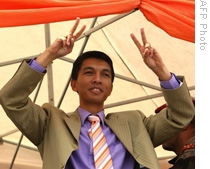Antananarivo
18 March 2009
 |
| Andry Rajoelina greets the crowd at a rally in Antananarivo, 18 Mar 2009 |
Madagascar's constitutional court declared Wednesday on national radio that opposition leader Andry Rajoelina has become president of the republic.
The court noted that President Marc Ravalomanana had resigned and handed power to the military. It said this left the decision to the military. The army said it did not wish to wield power but rather wanted Mr. Rajoelina to take charge.
The 34-year-old Rajoelina, who is six years younger than the minimum age required by the constitution to be president, earlier announced he was forming an interim government that would revise the constitution and hold elections within two years.
In a speech Tuesday at a central plaza, Mr. Rajoelina thanked the military for its support.
He praised the army for taking over a presidential office in the city center and invited the people to come with him to occupy it. Soldiers had seized the building a few hours before.
Mr. Ravalomana announced Tuesday he was stepping down due to the crisis characterized by what he called a polarization of opinion within the army and the citizenry.
He said it is crucial to re-establish order so that we can work together. We all love our country, he said, and appealed for serenity.
The dramatic transfer of power brought to a head weeks of confrontation that killed more than 100 people and hurt tourism and foreign investment.
The capital was calm and businesses operated normally although some embassies were closed. Residents expressed different opinions on the legality of the transition, but most expressed hope for peace and stability.
But some African governments expressed concerns over the legality of the transition.
Zambia says it is rejecting what it called the unconstitutional change of government and called for Madagascar's suspension in the African Union and Southern African Development Community, SADC.
The African Union said its Peace and Security council would review Madagascar's situation this week.
The Chairman of SADC, South Africa's President Kgalema Motlanthe, said its security organ would meet Thursday to discuss the development. He said SADC would never accept the unconstitutional transfer of power from a democratically elected government.
The European Union and United States have said that an unconstitutional transfer of power could bring sanctions.